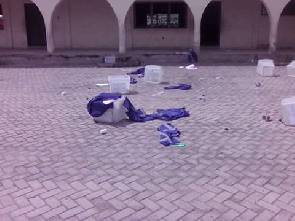 Greater Accra Regional Minister, Nii Laryea Afotey Agbo has expressed shock at the outbreak of cholera in the region.
Greater Accra Regional Minister, Nii Laryea Afotey Agbo has expressed shock at the outbreak of cholera in the region.
The outbreak has been described as a “complete epidemic” by the Regional Directorate of Health as it appears to be losing the battle against the disease, which has claimed nearly 40 lives since June. The disease is mostly attributed to poor hygienic practices.
Speaking Wednesday, on ‘Burning Issues’ on Adom FM, which was also broadcast live on Asempa FM, Mr. Afotey Agbo said the development is a blot on his personal reputation as Regional Minister, considering the fact that over 3,000 cases have been reported at various health facilities across the region.
Mr. Afotey Agbo said residents must equally be held responsible for failing to keep their surroundings clean while accusing the Ghana Water Company of not ensuring that people have clean water to drink which has accounted for the widespread of the cholera disease.
He said filth enter faulty pipelines that have been left unattended to for days and in some instances weeks, thereby contaminating the water supplied to consumers in their homes.
But the Deputy Minister for Water Resources, Works and Housing, Sampson Ahi rejected the accusation insisting that, the water company cannot be held liable under any circumstance, for the outbreak of the cholera disease.
Meanwhile, an officer at the Disease Control Unit of the Ghana Health Service, Michael Adjabeng has hinted that Ghana may suffer more cases of Cholera, should the sanitation condition in the country, particularly, the nation’s capital remain the same.
According to him, most areas littered with uncollected waste have become a safe haven for the causal agent of the disease to thrive.
“The Cholera Vibrio germ is such that it can easily survive in a ripe environment like what we are seeing now; with the poor sanitation and poor personal hygienic practices. It will take some time to have an environment free of the germ,” Mr. Adjabeng said.
He called for more collaborative work between the various stakeholders including authorities in environmental sanitation, communication and the others, to help disseminate information on the disease to the general public.





